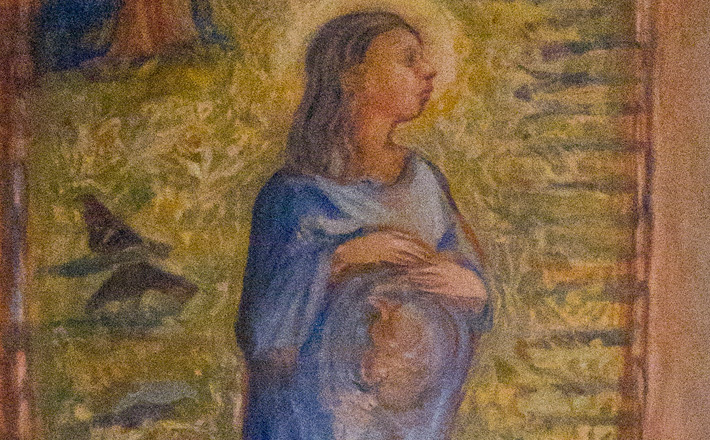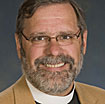Commentary on Psalm 80:1-7, 17-19
Don’t be a lectionary basher; respect the brothers and sisters responsible for the lectionary for the hard choices they’ve made.
For unless we’re committed to reading the whole Bible every Sunday, someone has to decide what really good stuff to leave out.
But about preaching on Psalm 80 I want to say this: Even if photosynthesis doesn’t make it into the sermon, you, the preacher, should enjoy the implicit petition for photosynthesis embedded in the psalm. We know from the omitted vv. 8-16 that the singers of the psalm adopt the classic metaphor of vineyard for the people of God.
How lovely that the repeated refrain (verses 3, 7, and 19) is the cry to “let your face shine, that we may be saved!” Sure, the mention of light works in general against the encroaching darkness during Advent (at least in the Northern Hemisphere) but the relationship of light and plant growth here is too cool not to mention.
Psalm 80 is a typical community lament — God is addressed and credentialed, the people’s troubles are laid out, God’s trustworthiness is rehearsed, and finally there is “the big ask.”
A few turns of phrase are worthy of contemplation. The NRSV renders verse 4 to say that God is angry with the people’s prayers — suggesting that maybe the prayers were deficient. Some versions prefer to frame verse 4 as God being angry against the people’s prayer — suggesting that the prayers are fine, but even so, God’s anger is unmoved by them.
Neither is an appealing prospect; both invite contemplation of the community’s failures. We learn nothing from this psalm about the specifics of the failure (as is the case with about half the corporate lament psalms). From one heavily cloaked clue in verse 18 (the phrase, “Then we will never turn back from you”) we could infer the community’s admission that they have turned back from God in the past.
In the reading and hearing of this psalmody, the parallel mention in verse 5 of “bread of tears” and “tears to drink” gives us poignant but elusive imagery. The word “bread” and the plucking of the vine from Egypt (in the omitted verse 8) together evoked for me the diet of manna during the Exodus. A Eucharistic sermon launched from verse 5 might explore how God moves us from lachrymose intolerance toward the feast on, in, and with suffering of which we partake at the Lord’s Table.
The “big ask” of this lament psalm begins in verse 14; on Advent 4 we will pick it up in the middle at verse 17. The psalm as performed, juxtaposed with the Immanuel prophecy in Isaiah 7, might have Christians thinking that the “one at your right hand” refers to Jesus.
Another possible referent (and the one that emerges from verses 14-18 as a unit) is the people of God themselves. They/we are the one at God’s right hand, whom God makes strong for God’s own self. In this sense, the “ask” tracks with prophetic themes of God’s people being purified, refined, and threshed for God’s mission.
Individual lament psalms are easier to preach; they have the capacity to connect with trouble at many levels of our lives. A challenge for interpreting corporate laments in the contemporary, white, North American church is claiming the “we” with integrity. Not being allowed to put a crèche on the town square is not “bread of tears” level persecution.
Yes, testimony about the post-Constantinian decline of the mainline names a real phenomenon, but many welcome that as a “correction,” God’s means of bringing the church to the way of the cross (for that sermon you’ll have to wait for Psalm 80:7-15 to be appointed … in October!).
Another approach to preaching Psalm 80 would be to refer the “we” in the psalm to those in our culture (or world) who are quenching their thirst with tears. Even if they are not people in official covenant relationship with God, the poor are always “God’s people.”
Here the church accompanies the poor as God shines and puts God’s hand upon them and gives them life. In this, the church might even hope to be a body about whom the poor would testify, “Immanuel!”
When I’m sitting in the pew on Advent 4, I’d like to hear a sermon empowered by God’s promised photosynthesis at the solstice. When God’s face shines, we are saved. The sermon could develop God’s anger at us covenant people for our typical ways of turning away from God or finding our anchor in worldly powers. Or the sermon could develop God’s reliable mercy for the downtrodden.
In either case, I long to hear how God is organically and essentially with us (as per our testimony about the Incarnation!). When God’s face shines, there is power to bring to life to that which has been trampled. And as Psalm 80 testifies, God’s power is sovereign, no quid pro quo; God alone acts. God shines and God empowers and directs the chemistry in us that produces lifeblood from God’s light and food.


December 22, 2013